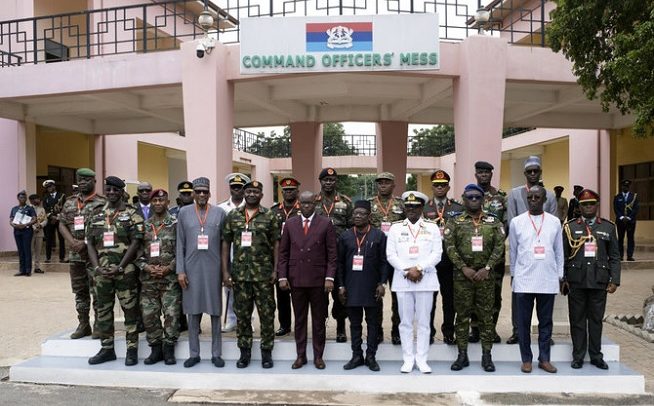ECOWAS Army chiefs
In 1956, Britain, in collusion with France and Israel, invaded Egypt to seize control of the Suez Canal, which Britain had operated through a “Suez Canal Company” that Britain had controlled in the heydays of British imperialism.
The reason? Egypt, under President Gamal Abdul Nasser, had nationalised the Suez Canal. In those days, if a “developing country” nationalised a company in which the Western countries had an interest, the action was largely taken in the West to be a declaration to “go Communist”.
Yews, those were the days of the “Cold War”, and no matter what good reasons a “developing country” had for nationalising a Western-controlled company, the “nationalisation” was taken for a first step towards taking sides – towards the Soviet Empire – in the Cold War.
But surprise, surprise, in the case of the Suez Canal, the United States did not support the action taken by Britain in collusion with the two other allies of the US – France and Israel.
Why the US did not support its allies’ invasion of Suez, was the cause of speculation throughout the world; speculation which has persisted to the present time. Of course, accounts have been given about why the US acted as it did.
One version has it that President Dwight Eisenhower of the United States harboured a personal dislike of the then British Prime Minister, Sir Anthony Eden. (Eden was regarded by many other actors on the international scene at the time as haughty and vain, traits of character which he was thought to have had developed, to propel him out of the overshadowing image of his former leader, the wartime British superhero, Prime Minister Sir Winston Churcill.)
Anyway, President Eisenhower threatened to withdraw US dollar support for the British pound. And Anthony Eden, together with his French and Israeli fellow conspirators, had to scamper from Egypt.
I retell this story because in the tragedy that is unfolding before our own eyes, the Niger coup and the expressed intention of ECOWAS to use all possible means – including a military invasion – restore Niger’s ousted president, Mr Mohamed Bazoum, to power, no-one knows exactly where the US stands.
The point is that there have been coups similar to the Niger coup in three other West African states – Mali (2020 and 2021); Guinea (2021) and Burkina Faso (2022). In none of those countries did any country – including ECOWAS members – sent military forces to intervene and restore the previous administration to power.
So why Niger? That is a question the US and France, as well as their allies, might well ask the ECOWAS members. They would most certainly reject the idea that the Niger coup is in line with a “trend” currently popular in West Africa, which could swallow the remaining civilian regimes too. The US and the others could well argue that ECOWAS was only acting in the self-interest of the remaining civilian regimes.
A more sinister rebuttal of any attempts by ECOWAS to convince the US and the others to back possible military action by ECOWAS could be that if the civilian governments eschewed corruption and unpopular measures in their own countries, they would have nothing to fear from their own military establishments, and that “trends” are created by people, not robots.
If the US, in particular, were to adopt that view, any military force sent by ECOWAS to Niger would be hard put to it not to suffer a devastating blow. You see, the US gave Niger direct aid of $1050 million only in March 2023.
Not only that, the aid was announced by the US Secretary of State, Anthony Blinken, himself. Can he be expected to tell his new ambassador to Niger, Kathleen Fitz Gibbon, that he made a mistake in approving then aid to Niger a mere four months ago? Not likely, is it?
More dangerous for ECOWAS is the fact that the US has committed a great deal of very sophisticated weaponry to Niger in a bid to defeat the jihadists who have been threatening life and property not only in Niger but also, Burkina Faso and Mali, in recent months.
Could an ECOWAS military force depend on the word of the Americans, if they were to pledge to ECOWAS that none of the American weapons – especially the powerful drones – that are stored in the US military facility at Agadez, would somehow manage to fall into the hands of the Niger forces “defending” their country from ECOWAS attacks?
So, then, ECOWAS would be in a place that is best described as being stuck between a rock and a hard place, if it were to take military action against Niger. On the other hand, it could become a laughing stock in Africa if it did nothing, after the hullabaloo it has made about going to Niger to fight for democracy there.
May the leaders of the organisation be provided with enough wisdom to find a way out of the dilemma. Perhaps their best bet would be to involve the African Union actively in trying to solve the problem. Certainly, a continental viewpoint, if one could emerge from the African Union, would be a more weighty decision to disregard than one formulated by a “mere regional organisation”.
www.cameronduodu.com
By Cameron Duodu


